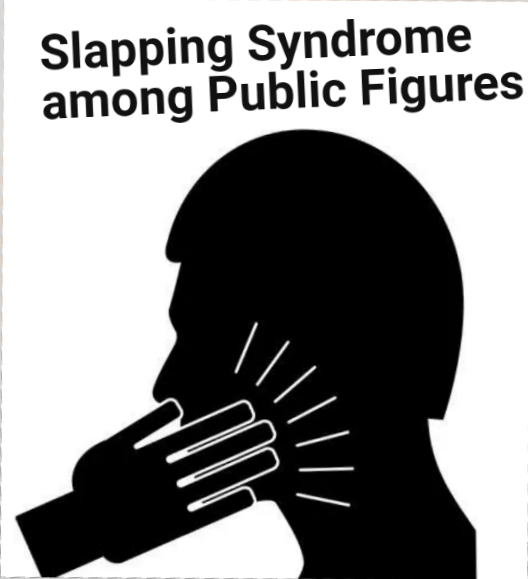By Kingsley Osadolor/ The Guardian, October 27, 2004
Join our WhatsApp Channel
THE hottest piece of news to tumble out of the Senate in the past fortnight has been the unedifying incident in which Senator Isah Mohammed slapped Senator Iyabo Anisulowo, his committee chair. An apparently contrite Mohammed appeared before the Senate last week, blaming the proverbial devil for his loss of self-control that resulted in his battering a female colleague. He is currently on a two-week suspension. Senator Anisulowo, on the other hand, has rather than seek recourse to the law, announced her forgiveness of her errant committee member. What remains outstanding is how the Senate will deal with the causative factor of the brush between the two senators, namely, a proper accounting by Anisulowo for the funds of the committee. Not unlike the typical Nigerian, “slap” has become a handy word to describe situations of rebuff. Thus, when Prof. Chinua Achebe spurned the conferment of a national honour, he was reported to have “slapped” the Federal Government.
When Transparency International released its annual rating that left Nigeria stranded as the world’s third most corrupt country, TI was reported to have “slapped” the government.
As an expression of aggression, a slap is a slap. The commonest and, perhaps, more natural form of its delivery is the forehand slap. The arm is lifted and with a quick-jerk motion of the elbow and the wrist, the face of the hand goes into a lightning motion and lands where it is intended: the face. But there is also the backhand slap. In addition to aggression, it often tends to connote a higher degree of insult and disdain. A backhand slap requires more effort and deliberation to deliver. Because it is usually intended as a coup de grace, a backhand slap is more energy-sapping. A backhand slap that is delivered first before a forehand in an aggressive encounter that witnesses such assault and battery, loses to a very great extent its effect of disdain.
The Holy Book, quite literally, recognises a backhand slap as a coup de grace. Thus, when it exhorts followers of and believers in the scriptures to turn the other cheek when assaulted on one cheek, there is an inference that a backhand awaits the turned cheek, where the aggressor is unreasonable enough to appreciate the deeper moral lessons of the turned cheek. If Israel followed the cheek principle, perhaps the Middle East would be less incendiary. It is largely on account of Israel’s eye-for-eye disposition, underpinned by its strong and understandable desire for self-preservation and perpetuation, that blind hate reigns in that region.
A pat is like a slap. The difference between them lies in the force applied and the intention. But you cannot pat with a backhand; a pat is almost always a forehand and delivered as gentle slaps not necessarily with the palm open, but with the hand forming a minimal arc, something like a flimsy cup. Although you can pat on the face, it is almost like rubbing the face, and more effective when done with both hands at the same time. If you applied the intensity with which a pat is delivered on the back to the face, the receiver is more likely to construe it as being more than a gesture — rather it stings like a forewarning of a hostile act. The back is the natural recipient of a pat.
While nearly every part of the human body is amenable to a slap, the feeling of insult, and therefore assault and battery, is greatest when the face is slapped. To slap the provocative bum of a woman without her consent is of course an act of battery, and in social transactions it is indecent, because it is seen as a variant of sexual harassment. But for all human beings, it is a slap in the face that is most worrisome. Strangely, the human face seems appropriately constructed for that type of aggression, for persons so inclined. Why a slap in the face constitutes the highest insult is because of what the face represents. The face is our identity. The face is a critical component of the human head that distinguishes one from the other. If you piled a dozen headless bodies together, such as the insurgents have been doing in Iraq, every normal human being would recoil at the sight, because the decapitation wipes out the identity at first glance.
When, therefore, you are slapped in the face, it is your identity, your being, that is being assaulted and battered. Watch out, for instance, when people are engaged in a shouting match that eventually degenerates into fisticuffs. Usually, before the more aggressive party loses self-control and lands a slap, he would often be heard to scream at his opponent: “Who the hell are you?” That question interrogates your identity; it attacks your personality and seeks to reduce your esteem in the fiery eyes of your attacker who then pitches forward and delivers a slap.
In the imagination of the attacker, a slap is more effective when the victim is standing erect, for then his profile as well as identity is in full view and the humiliation to his esteem is deemed more telling in such circumstance. That is why, in a brawl, rarely is a fallen man slapped. He might be trampled upon or punched, because his attacker deems these means more effective. Note that in the course of evolution, bipedalism, that is, the ability to walk on two legs, is one of the cardinal characteristics that distinguishes man from his simian cousins like apes and chimpanzees. That ability to stand and walk erect is part of man’s profile enhanced by his visage. A provocative slap in the face is insulting to that evolutionary profile.
READ ALSO: Bianca Ojukwu And Mrs Obiano
As insults go, a slap, though relatively less damaging on impact, is far more effective than a punch. The latter constitutes a higher degree of aggression that dis¬closes a retreat into more primitive and bestial forms of existence. Yet, not every slap is an insult. A rebuke, for instance, is not necessarily an insult. Thus, a slap on the wrist, which means a mild rebuke, is a figurative expression that denotes double standard. A spank is a slap on the bum. Where the intention is correctional, it is legal under the Criminal Code, and does not, therefore, constitute an insult or assault and battery. A high-five is a consensual slap of hands between two persons, in a celebratory mood, and cannot, therefore, be an insult.
Considering the pervasive lawlessness in the country, there is little question that if persons were to invoke their rights and sue for tortious wrongs of trespass to the person, such as assault and battery, the legal system would be gridlocked with cases. Similarly, if the State were to give full effect to the provisions of Chapter 25 of the Criminal Code, which chapter deals with assaults and violence to the person generally, there would be no inch of space in the already overcrowded jail-houses, to accommodate fresh inmates that would be arriving in droves. Even the common threats that are legally classified as assault do not have any significance for the lawless in our midst. “If you no take time, I go just sammer your face,” often accompanied with a threatening lift of the hand, is the least worrisome expression you hear among those who used to be called “garage boys” but have since graduated in infamy into “area boys”.
What in the popular parlance is referred to as assault is, legally speaking, battery. Assault is to intentionally and unlawfully put another person in apprehension of an imminent battery. On the other hand, battery is the intentional and unlawful application of force to another person, although there need not be direct physical contact between the assailant and the victim.
Thus, section 252 of the Criminal Code provides: “A person who strikes, touches, or moves, or otherwise applies force of any kind to, the person of another, either directly or indirectly, without his consent, or with his consent, if the consent is obtained by fraud, or who by any bodily act or gesture attempts or threatens to apply force of any kind to the person of another without his consent, in such circumstances that the person making the attempt or threat has actually or apparently a present ability to effect his purpose, is said to assault that other person, and the act is called an assault. The term ‘applies force’ includes the case of applying heat, light, electrical force, gas, odour, or any other substance of thing whatever, if applied in such a degree as to cause injury or personal discomfort.”
First published in The Guardian on October 27, 2004












